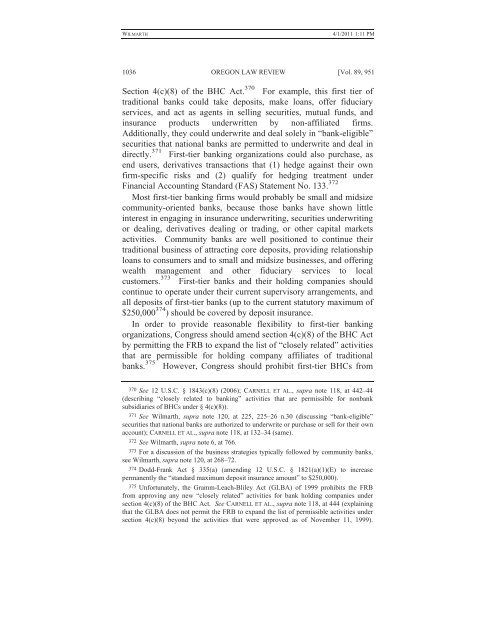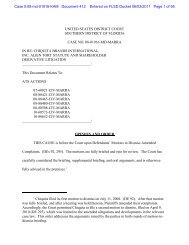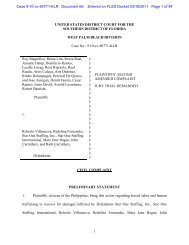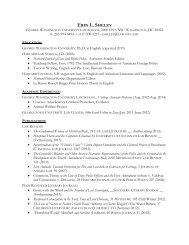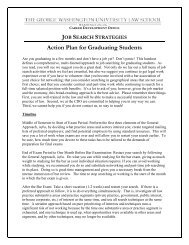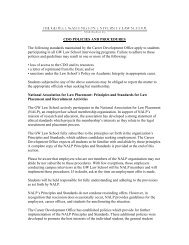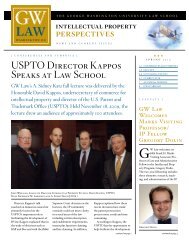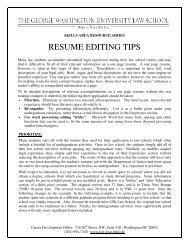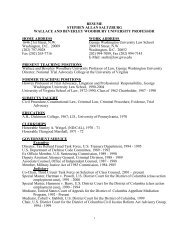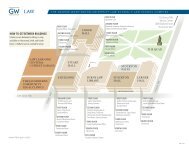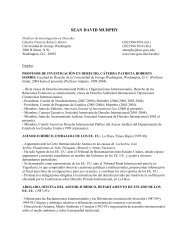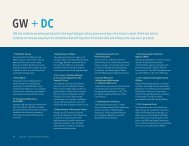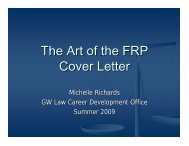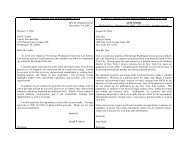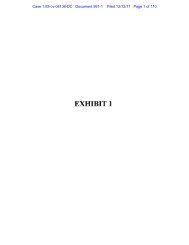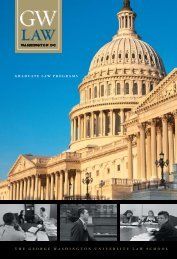CLE Materials for Panel #1 - George Washington University Law ...
CLE Materials for Panel #1 - George Washington University Law ...
CLE Materials for Panel #1 - George Washington University Law ...
You also want an ePaper? Increase the reach of your titles
YUMPU automatically turns print PDFs into web optimized ePapers that Google loves.
WILMARTH<br />
4/1/2011 1:11 PM<br />
1036 OREGON LAW REVIEW [Vol. 89, 951<br />
Section 4(c)(8) of the BHC Act. 370 For example, this first tier of<br />
traditional banks could take deposits, make loans, offer fiduciary<br />
services, and act as agents in selling securities, mutual funds, and<br />
insurance products underwritten by non-affiliated firms.<br />
Additionally, they could underwrite and deal solely in “bank-eligible”<br />
securities that national banks are permitted to underwrite and deal in<br />
directly. 371 First-tier banking organizations could also purchase, as<br />
end users, derivatives transactions that (1) hedge against their own<br />
firm-specific risks and (2) qualify <strong>for</strong> hedging treatment under<br />
Financial Accounting Standard (FAS) Statement No. 133. 372<br />
Most first-tier banking firms would probably be small and midsize<br />
community-oriented banks, because those banks have shown little<br />
interest in engaging in insurance underwriting, securities underwriting<br />
or dealing, derivatives dealing or trading, or other capital markets<br />
activities. Community banks are well positioned to continue their<br />
traditional business of attracting core deposits, providing relationship<br />
loans to consumers and to small and midsize businesses, and offering<br />
wealth management and other fiduciary services to local<br />
customers. 373 First-tier banks and their holding companies should<br />
continue to operate under their current supervisory arrangements, and<br />
all deposits of first-tier banks (up to the current statutory maximum of<br />
$250,000 374 ) should be covered by deposit insurance.<br />
In order to provide reasonable flexibility to first-tier banking<br />
organizations, Congress should amend section 4(c)(8) of the BHC Act<br />
by permitting the FRB to expand the list of “closely related” activities<br />
that are permissible <strong>for</strong> holding company affiliates of traditional<br />
banks. 375 However, Congress should prohibit first-tier BHCs from<br />
370 See 12 U.S.C. § 1843(c)(8) (2006); CARNELL ET AL., supra note 118, at 442–44<br />
(describing “closely related to banking” activities that are permissible <strong>for</strong> nonbank<br />
subsidiaries of BHCs under § 4(c)(8)).<br />
371 See Wilmarth, supra note 120, at 225, 225–26 n.30 (discussing “bank-eligible”<br />
securities that national banks are authorized to underwrite or purchase or sell <strong>for</strong> their own<br />
account); CARNELL ET AL., supra note 118, at 132–34 (same).<br />
372 See Wilmarth, supra note 6, at 766.<br />
373 For a discussion of the business strategies typically followed by community banks,<br />
see Wilmarth, supra note 120, at 268–72.<br />
374 Dodd-Frank Act § 335(a) (amending 12 U.S.C. § 1821(a)(1)(E) to increase<br />
permanently the “standard maximum deposit insurance amount” to $250,000).<br />
375 Un<strong>for</strong>tunately, the Gramm-Leach-Bliley Act (GLBA) of 1999 prohibits the FRB<br />
from approving any new “closely related” activities <strong>for</strong> bank holding companies under<br />
section 4(c)(8) of the BHC Act. See CARNELL ET AL., supra note 118, at 444 (explaining<br />
that the GLBA does not permit the FRB to expand the list of permissible activities under<br />
section 4(c)(8) beyond the activities that were approved as of November 11, 1999).


